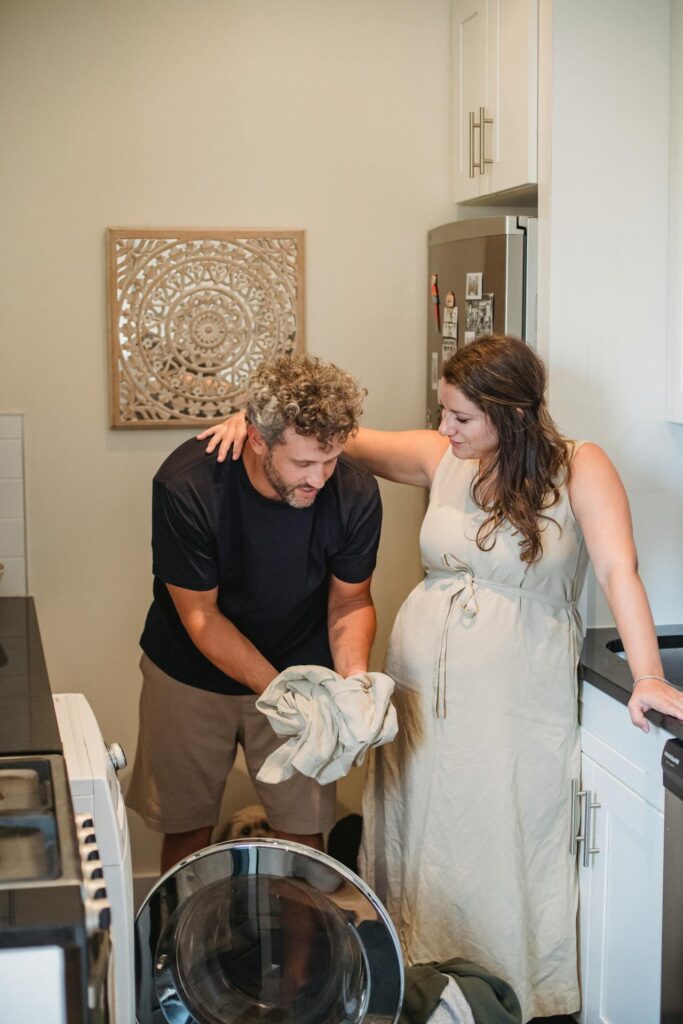
Join 130k subscribers and get the best of the week, straight to your inbox.
Are you feeling snappy towards your husband more than you’d like since the baby arrived? If so, you’re definitely not alone.
Here is what a fellow mama shared on Quora:
“After the birth of my first child, I hated my husband and was googling divorce attorneys… After about 3 months, everything was okay. Fast-forward to baby number 2, and I have the same response: I hated everything, from how he breathed to how he slept while I was awake. I hated his voice, his face… everything. Guess what? About three months later, everything was okay. Come to baby number 3 and I was ready for it. The first time I googled a divorce attorney, I was inwardly smiling. He noticed and asked me what I was laughing about, so I told him and we both dissolved into laughter. It took less than 3 months to get over my hatred for him this time.”
Lol. Do you see how chaotic her relationship was with her husband after each birth?
I also remember those days all too well when I was doing midnight feedings, my back was killing me, my breasts used to remain sore—-and I never slept enough.
That’s when the partnership with my husband started to feel off, and I couldn’t put my finger on why I was mad at him over the tiniest things.
Even though my husband was (and is) a hands-on parent, postpartum resentment towards husband crept in. I was mostly frustrated with him, which meant I couldn’t communicate without taunts, and as a result, he felt I was being unfair to him.
Long story short, it took us a few months to let parenthood settle in and find our old connection back. If you’re also feeling disconnected from husband after baby, let’s unpack those feelings together and find a way out. With my experience, you’ll likely won’t have to spend months in that zone.
What is Postpartum Resentment?
Postpartum resentment towards husband is a feeling of frustration or bitterness that you may experience after bringing a baby into the family. This complex emotion often stems from the major changes and pressures that come with parenthood. While it’s natural to expect some adjustments, this resentment after childbirth can catch you off guard and make you wonder what’s happening in your relationship.
But since postpartum rage or resentment is common, rest assured knowing that it’s not a reflection of a failing relationship. It is rather an indicator that some needs might not be met.
Why Do I Feel Disconnected from My Husband After Baby?
Feeling disconnected from your husband after having a baby can make you feel even more isolated. The shift from being a couple to becoming parents can put a strain on even the strongest relationships.
Here are some reasons you feel resentment after childbirth:
Unequal Distribution of Household and Childcare Responsibilities

Babies require a lot of work, and when most of that work falls on one person, it can breed resentment. Research shows that unequal sharing of responsibilities can cause postpartum resentment towards husband because mothers feel responsible for everything.
If you have to handle the majority of the feedings, diaper changes, and household chores while your husband seems less involved because he’s at work, you’ll feel resentful. Such an imbalance can make you feel like you’re carrying the weight of parenthood alone.
Also Read: Why Do I Feel Disconnected From My Husband
Lack of Emotional Support from Husband During Postpartum

The whole pregnancy and postpartum period is an emotional whirlwind. The mom’s hormones are fluctuating, and she’s adjusting to a new role while recovering physically. At this point, if her husband isn’t providing the emotional support, she’ll slip into parental burnout and resentment. Perhaps he doesn’t check in on how the new mama is feeling, or he dismisses her concerns as just “baby blues.”
Sleep Deprivation and Hormonal Changes
Lack of sleep can turn the best of us into headless chickens because we need that time to recharge. Throw into the next new motherhood, and you’re up for sleep rage (just like road rage).
When you’re running on fumes, small irritations can escalate and even result in a meltdown. Coupled with hormonal changes, it’s a perfect storm for heightened emotions, which can make you snap at your husband for things that wouldn’t have bothered you before.
Feeling Isolated or Misunderstood

Becoming a mother can change how you see yourself and how you think others see you. You might feel like your identity has shifted entirely to being a “mom” and that no one else gets what you’re going through. All this can be disorienting.
Besides the social circle, if your husband also doesn’t seem to understand these changes, you will feel isolated and disappointed in husband after baby.
Loved this reflection?
Join The Now Edit — my weekly letter for women reimagining how they live, work, and show up in the world.
Soulful storytelling. Gentle Strategy. Real Tranformation.
By signing up, you’re agreeing with our terms and conditions.
Postpartum Depression or Anxiety
We can’t brush everything under the rug of ‘baby blues’ because sometimes, things are more serious. The feelings of postpartum resentment towards husband can be more than just situational—they could be signs of postpartum depression (PPD) because between 10% to 20% of mothers get it. This condition can impact how you feel about yourself and result in you feeling unwanted after having a baby, even if that’s not the case.
Is It Normal to Feel Resentment Towards Husband After Baby?

Yes, it’s normal to feel resentment toward your husband after having a baby, and over 80% of women feel baby blues during this period.
Bringing a baby into the family is a huge change that impacts mothers more intensely. As a mom, you’re dealing with hormonal changes, physical recovery, and the emotional rollercoaster of new parenthood. It’s natural to feel overwhelmed and to perceive that you have an unsupportive husband postpartum who isn’t pulling equal weight or isn’t being appreciative enough.
However, not everyone’s postpartum resentment towards husband (or in general) isn’t the same. You could be having baby blue, there might be undiagnosed postpartum depression, or your situation could have taken an extreme turn to become postpartum psychosis.
Here is a breakdown of the general symptoms of these conditions to take note of, according to Mayo Clinic:
| Condition | Symptoms |
| Baby Blues | – Frequent mood fluctuations – Feelings of anxiety and sadness – Irritability – A sense of being overwhelmed – Sporadic crying spells – Diminished ability to concentrate – Changes in appetite – Sleep disturbances |
| Postpartum Depression | – Persistent depressed state or extreme mood swings – Excessive crying – Difficulty establishing a connection with the baby – Withdrawal from social interactions – Significant changes in appetite – Insomnia or excessive sleeping – Pervasive fatigue or loss of energy – Reduced interest in previously enjoyed activities – Heightened irritability and rage – Doubts about mothering abilities – Despair and hopelessness – Feelings of worthlessness or inadequacy – Impaired decision-making and concentration – Agitation – Extreme anxiety and panic attacks – Thoughts of self-harm or harming the baby – Suicidal ideation or thoughts of death |
| Postpartum Psychosis | – Disorientation and confusion – Obsessive thoughts concerning the baby – Hallucinations and delusions – Sleep disturbances – Excessive energy and agitation – Paranoia – Attempts at self-harm or harming the bab |
If you’re unsure about the severity of your symptoms, do not self-diagnose and seek a medical expert’s opinion to decide which route to take.
How Long Does Postpartum Resentment Last?
There is no set duration of postpartum resentment because, for some mothers, these feelings can start to fade after a few weeks as everyone settles into new routines. For others, the resentment or feeling neglected by spouse after baby can linger for months, especially if the underlying issues aren’t addressed.
Also Read: Pregnancy Capsule Wardrobe
7 Strategies to Overcome Postpartum Resentment Towards Husband
If you’re feeling neglected by your spouse after the baby, know that it can go away, and you two can resolve things. Remember a fellow mum’s example I shared right at the beginning? That’s how things can change once your life and hormones settle down.
But if things remain or feel unsettled, we have many ways of overcoming postpartum resentment towards husband. The following few ways can help you contain post-baby relationship changes before they turn into built-up resentment:
Open Communication About Feelings and Needs
Talking openly with your husband is the most obvious yet most neglected first step. He might not realize how you’re feeling or understand the depth of your emotions.
Choose a calm moment to sit together and share your thoughts of how isolated or tired you’re feeling. Let him know what’s been weighing on you—whether it’s feeling overwhelmed with childcare, needing more emotional support, or wanting acknowledgement for all you’re juggling. Encourage him to share his feelings too.
Communicating with your spouse after the baby can bridge gaps and help both of you understand each other better.
Here’s what a Redditor shared about overcoming her postpartum resentment towards husband:
“I am a SAHM but about to start working again. For me, part of the issue in my case is not speaking up about needing some non-baby time. It took me a while to learn that I have to be VERY explicit that I want some uninterrupted time. I assumed my husband would look after the baby on the weekend since I watch her for 4 hours while he goes to practice after I’ve watched her the whole week (days and most evenings). But turns out I needed to say that out and often”.
Couples Therapy or Counseling

Coping with postpartum resentment gets easier when you have expert help because they know the ropes of this whole life change. Couples therapy or counseling offers a safe space for both of you to express your feelings and work through challenges.
A therapist will provide you insights into communicating more assertively so you can convey what’s missing and what’s needed. Seeking therapy isn’t a sign of a failing relationship; it’s a proactive step toward strengthening it.
Also Read: How to Dress Like a Cool Mom in 2024
Establishing a Fair Division of Household and Childcare Duties

Feeding the LO through the night shouldn’t be on the mother only (even if the new mom is exclusively breastfeeding, there are ways to take some of her load). Because when she feels she’s the one carrying the whole weight, it results in postpartum rage.
You two should list out all the household and childcare tasks and divide them in a way that feels fair to both of you. Maybe he can handle morning feedings while you take on bedtime routines, or perhaps chores can be split based on preferences and schedules. Regularly revisiting this division helps ensure there’s balance.
Here’s what a Reddit user shared about overcoming postpartum resentment towards husband:
“My husband and I talk about resentment A LOT, and we do a lot of rebalancing week by week. A big one for a while was he would take the monitor after we put the baby to bed so I could do what I wanted (bath, workout, read, have a friend over), and the baby wasn’t my responsibility for a couple of hours.”
Seeking Social Support from Friends and Family
It takes a village to raise a kid, so learn to lean on your village. Reach out to friends or family members who can offer a listening ear or practical help. Sharing your experiences with someone who has been there can provide comfort and valuable insights. They may offer to watch the baby for a couple of hours so you and your husband get some much-needed time, and it’ll bring a positive change to your routine.
Prioritizing Self-Care and Rest

New mamas don’t even get the time to pee in peace, let alone do self-care. But once the initial storm is settled, remember to show yourself some love. You should Carry out small pockets of time for yourself in which you take a relaxing bath, enjoy tea in peace, or engage in a hobby.
This self-care could be as simple as a long hot bath in which you aren’t disturbed by a crying voice. Let me tell you, the toddler phase is going to be even more chaotic, so build a habit of handing the baby to your husband or another family member while you take some time off. Also, encourage your husband to do the same. When both of you prioritize self-care, you’ll have more patience and energy to support each other.
Couple-Bonding Activities

Most couples put their relationship on the back burner as new parents but it’s one of the worst things to do. If you two build (and stick to) separate routines and there’s no shared time, you’ll further drift apart. So even if you have to keep the baby in tow, don’t stop doing your couple things.
I really like this Redditor’s settlement with her husband:
“When I was a new mom, we went out a lot together as a family—on walks, out to lunch, and made plans with our friends. We brought the baby along; of course, it’s not the same as our couple outings, but there’s also no reason you need to be cooped up at home just because you’re breastfeeding. Also, it helped that when we were out, my husband did everything for the baby aside from the nursing. So at least I could mentally “check out” to some degree even though the baby was there.”
Medical Consultation For Postpartum Depression Or Anxiety

Postpartum depression and marriage don’t go along, which is why you should seek medical help if things feel serious. If you’re feeling persistent sadness, anxiety, or hopelessness, consult a healthcare professional right away, and they’ll help tackle the situation.
Postpartum depression and anxiety are not uncommon, but they’re often ignored as simple baby blues. But you’re the better judge of your mind and feelings; if you feel more than overwhelmed, know that help is available. Speaking with a doctor can provide you with resources and treatment options.
Giving Birth Changes You Inside Out, Don’t Shush Your Feelings
Bringing a new life into the world transforms you physically, emotionally, and mentally. Therefore, it’s important to acknowledge and honor your feelings, including postpartum resentment towards husband, during this time.
Suppressing emotions like frustration or feeling isolated won’t make them disappear; in fact, they may intensify. Facing these feelings openly will give you the chance to heal and adapt. Remember, it’s okay to seek support and to communicate your needs.
Suggested Reads:
FAQs
Can postpartum resentment affect my relationship long-term?
Yes, if left unaddressed, postpartum resentment can impact your relationship over the long haul. Persistent feelings of frustration or bitterness can create emotional distance between you and your husband.
What are the signs that postpartum resentment is impacting my marriage?
Some signs include frequent arguments over minor issues, feeling emotionally distant, or withdrawing from each other. You may also notice a lack of interest in spending time together or a decline in physical affection. These indicators suggest that the resentment is affecting your connection.
How can I communicate my feelings of resentment to my husband effectively?
Choose a calm moment to talk and approach the conversation with openness. Use “I” statements to express how you’re feeling, such as “I feel overwhelmed when…” instead of “You never help with anything,” as that sounds like blaming. Be specific about what you need from him, whether it’s more help with the baby or emotional support. As you might already know, men need to be told things explicitly; don’t shy away from doing that.
Zakia Lott
More Like This:









One Response
I truly appreciate this post. I¦ve been looking all over for this! Thank goodness I found it on Bing. You have made my day! Thank you again